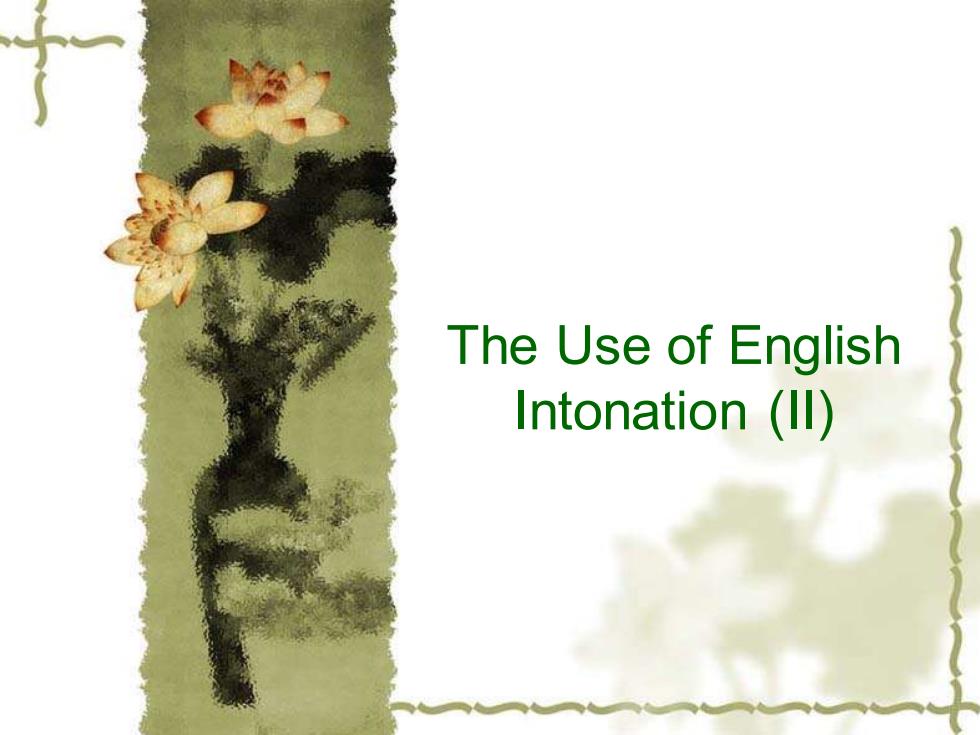
The Use of English Intonation (II)
The Use of English Intonation (II)
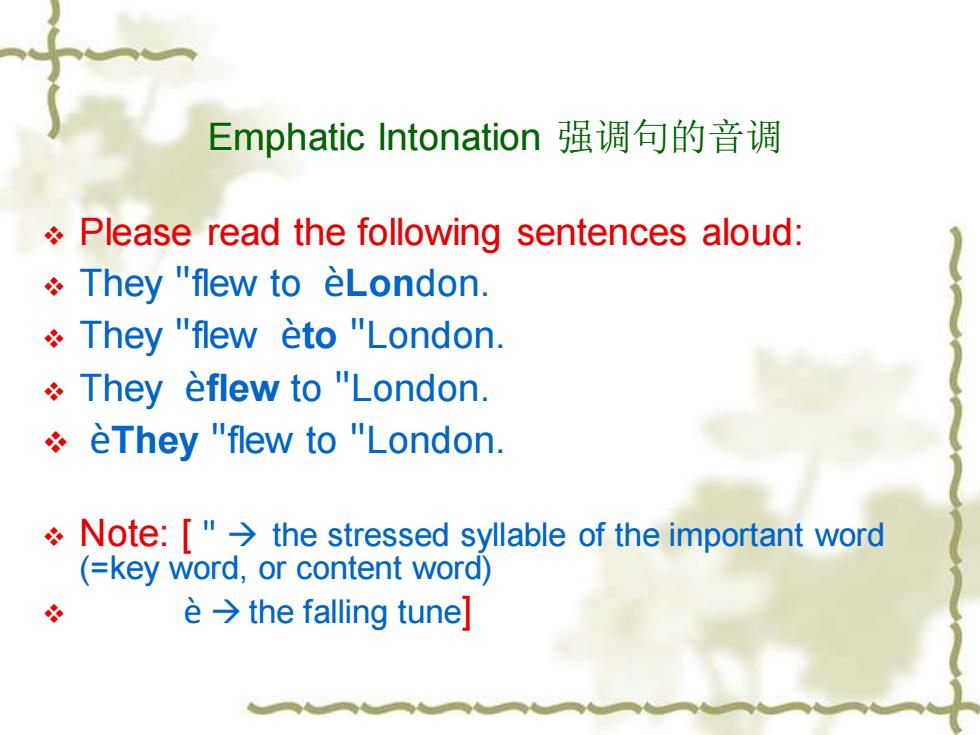
Emphatic Intonation强调句的音调 Please read the following sentences aloud: They "flew to eLondon. They "flew eto "London. They eflew to "London. eThey "flew to "London. 冬 Note:["the stressed syllable of the important word (=key word,or content word) e→the falling tune]
Emphatic Intonation 强调句的音调 ❖ Please read the following sentences aloud: ❖ They "flew to èLondon. ❖ They "flew èto "London. ❖ They èflew to "London. ❖ èThey "flew to "London. ❖ Note: [ " → the stressed syllable of the important word (=key word, or content word) ❖ è → the falling tune]
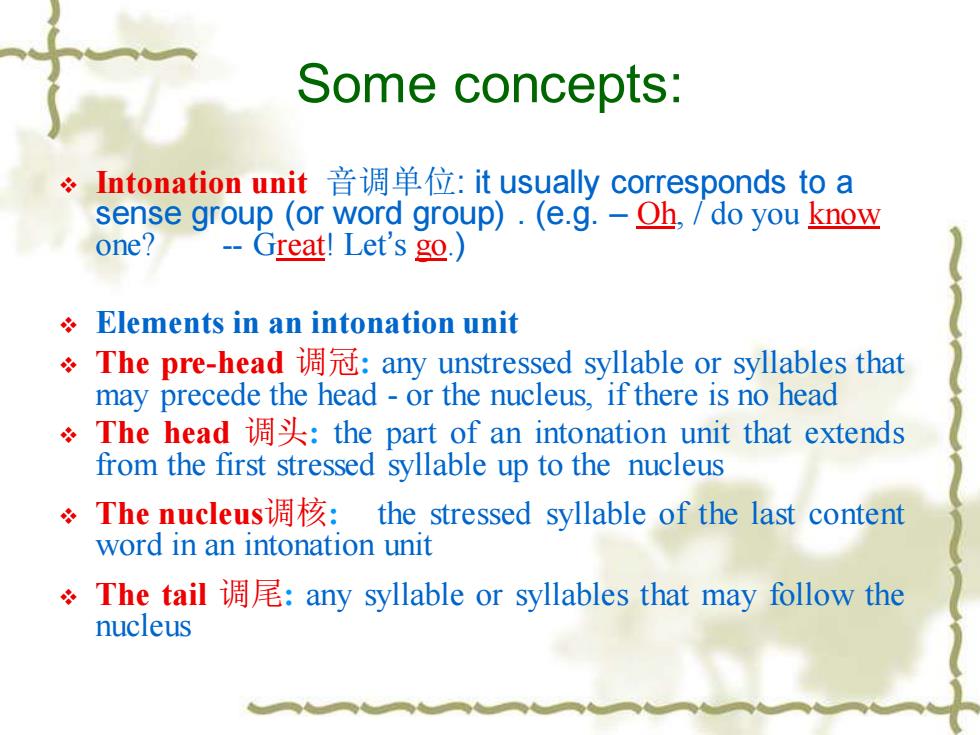
Some concepts: 冬ntonation unit音调单位:it usually corresponds to a sense group (or word group).(e.g.-Oh,do you know one? -Great!Let's go.) Elements in an intonation unit 冬 The pre-head调冠:any unstressed syllable or syllables that may precede the head-or the nucleus,if there is no head The head调头:the part of an intonation unit that extends from the first stressed syllable up to the nucleus The nucleus调核:the stressed syllable of the last content word in an intonation unit ÷The tail调尾:any syllable or syllables that may follow the nucleus
Some concepts: ❖ Intonation unit 音调单位: it usually corresponds to a sense group (or word group) . (e.g. – Oh, / do you know one? - Great! Let’ s go.) ❖ Elements in an intonation unit ❖ The pre-head 调冠: any unstressed syllable or syllables that may precede the head - or the nucleus, if there is no head ❖ The head 调头: the part of an intonation unit that extends from the first stressed syllable up to the nucleus ❖ The nucleus调核: the stressed syllable of the last content word in an intonation unit ❖ The tail 调尾: any syllable or syllables that may follow the nucleus
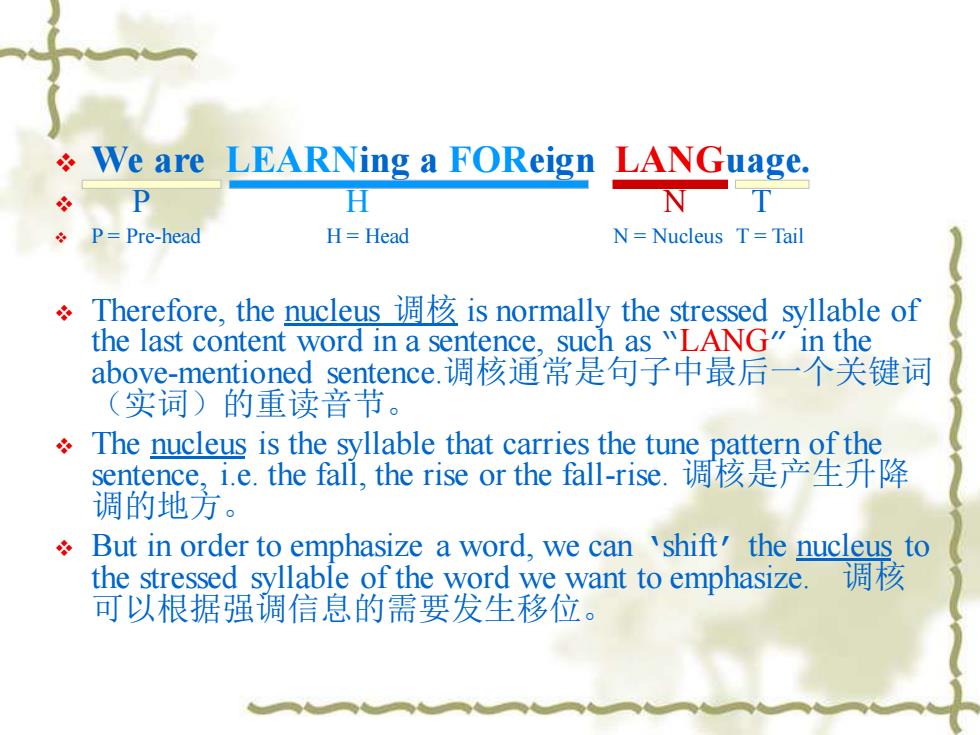
We are LEARNing a FOReign LANGuage. P H ÷P=Pre-head H=Head N=Nucleus T=Tail ÷Therefore,the nucleus週柩is normally the stressed syllable of the last content word in a sentence,such as "LANG"in the above-mentioned sentence.调核通常是句子中最后一个关键词 (实词)的重读音节。 The nucleus is the syllable that carries the tune pattern of the sentence,.i.e.the fall,the rise or the fall-rise.调核是产生升降 调的地方。 But in order to emphasize a word,we can 'shift'the nucleus to the stressed syllable of the word we want to emphasize. 可以根据强调信息的需要发生移位
❖ We are LEARNing a FOReign LANGuage. ❖ P H N T ❖ P = Pre-head H = Head N = Nucleus T = Tail ❖ Therefore, the nucleus 调核 is normally the stressed syllable of the last content word in a sentence, such as “LANG” in the above-mentioned sentence.调核通常是句子中最后一个关键词 (实词)的重读音节。 ❖ The nucleus is the syllable that carries the tune pattern of the sentence, i.e. the fall, the rise or the fall-rise. 调核是产生升降 调的地方。 ❖ But in order to emphasize a word, we can ‘shift’ the nucleus to the stressed syllable of the word we want to emphasize. 调核 可以根据强调信息的需要发生移位
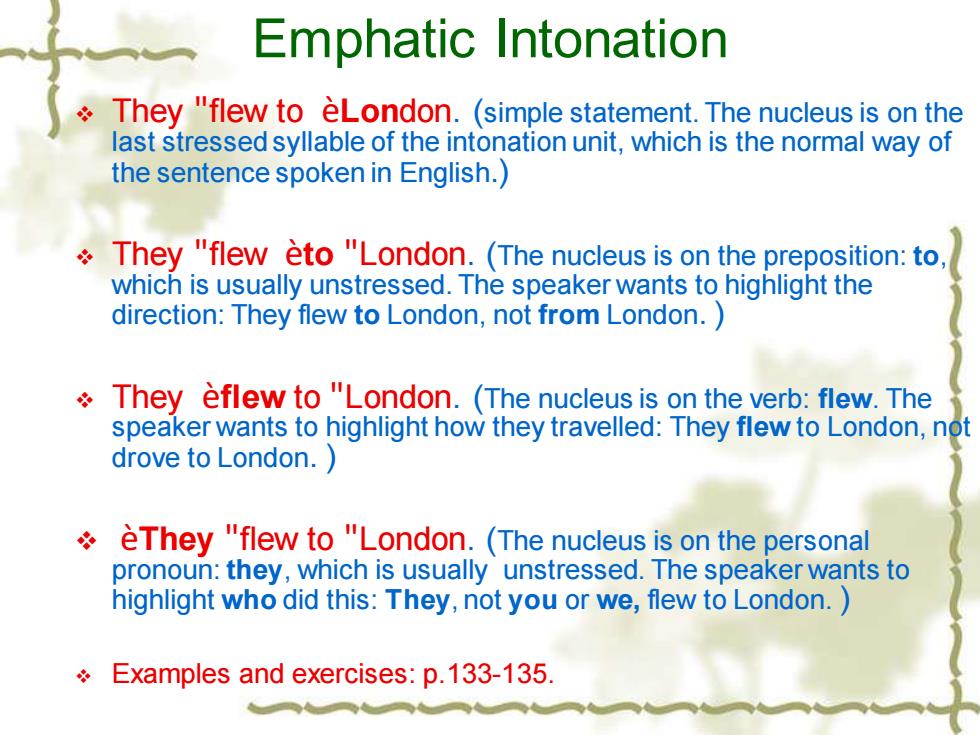
Emphatic Intonation They "flew to eLondon.(simple statement.The nucleus is on the last stressed syllable of the intonation unit,which is the normal way of the sentence spoken in English.) They "flew eto "London.(The nucleus is on the preposition:to which is usually unstressed.The speaker wants to highlight the direction:They flew to London,not from London. They eflew to "London.(The nucleus is on the verb:flew.The speaker wants to highlight how they travelled:They flew to London,not drove to London. eThey "flew to "London.(The nucleus is on the personal pronoun:they,which is usually unstressed.The speaker wants to highlight who did this:They,not you or we,flew to London. Examples and exercises:p.133-135
❖ They "flew to èLondon. (simple statement. The nucleus is on the last stressed syllable of the intonation unit, which is the normal way of the sentence spoken in English.) ❖ They "flew èto "London. (The nucleus is on the preposition: to, which is usually unstressed. The speaker wants to highlight the direction: They flew to London, not from London. ) ❖ They èflew to "London. (The nucleus is on the verb: flew. The speaker wants to highlight how they travelled: They flew to London, not drove to London. ) ❖ èThey "flew to "London. (The nucleus is on the personal pronoun: they, which is usually unstressed. The speaker wants to highlight who did this: They, not you or we, flew to London. ) ❖ Examples and exercises: p.133-135. Emphatic Intonation
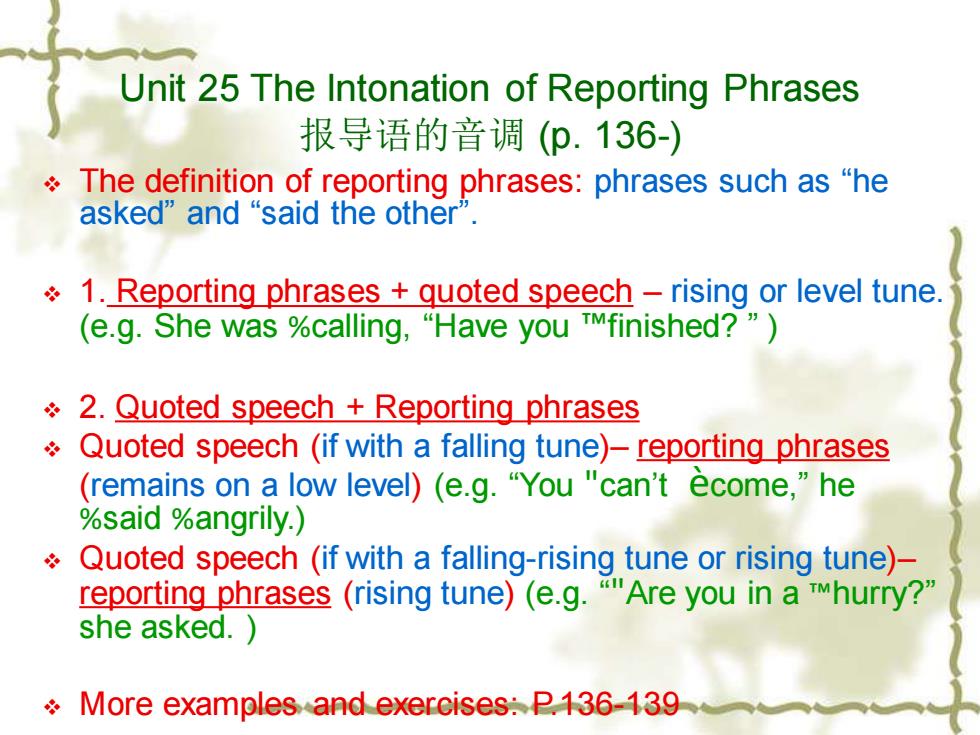
Unit 25 The Intonation of Reporting Phrases 报导语的音调(p.136-) The definition of reporting phrases:phrases such as "he asked”and“said the other'”. 1.Reporting phrases quoted speech-rising or level tune (e.g.She was %calling,"Have you TMfinished?" 冬 2.Quoted speech Reporting phrases 女 Quoted speech (if with a falling tune)-reporting phrases (remains on a low level)(e.g."You "can't ecome,"he %said %angrily.) Quoted speech(if with a falling-rising tune or rising tune)- reporting phrases (rising tune)(e.g.""Are you in a TMhurry?" she asked. More examples and exercises:P136-139
Unit 25 The Intonation of Reporting Phrases 报导语的音调 (p. 136-) ❖ The definition of reporting phrases: phrases such as “he asked” and “said the other”. ❖ 1. Reporting phrases + quoted speech – rising or level tune. (e.g. She was %calling, “Have you ™finished? ” ) ❖ 2. Quoted speech + Reporting phrases ❖ Quoted speech (if with a falling tune)– reporting phrases (remains on a low level) (e.g. “You "can’t ècome,” he %said %angrily.) ❖ Quoted speech (if with a falling-rising tune or rising tune)– reporting phrases (rising tune) (e.g. “"Are you in a ™hurry?” she asked. ) ❖ More examples and exercises: P.136-139
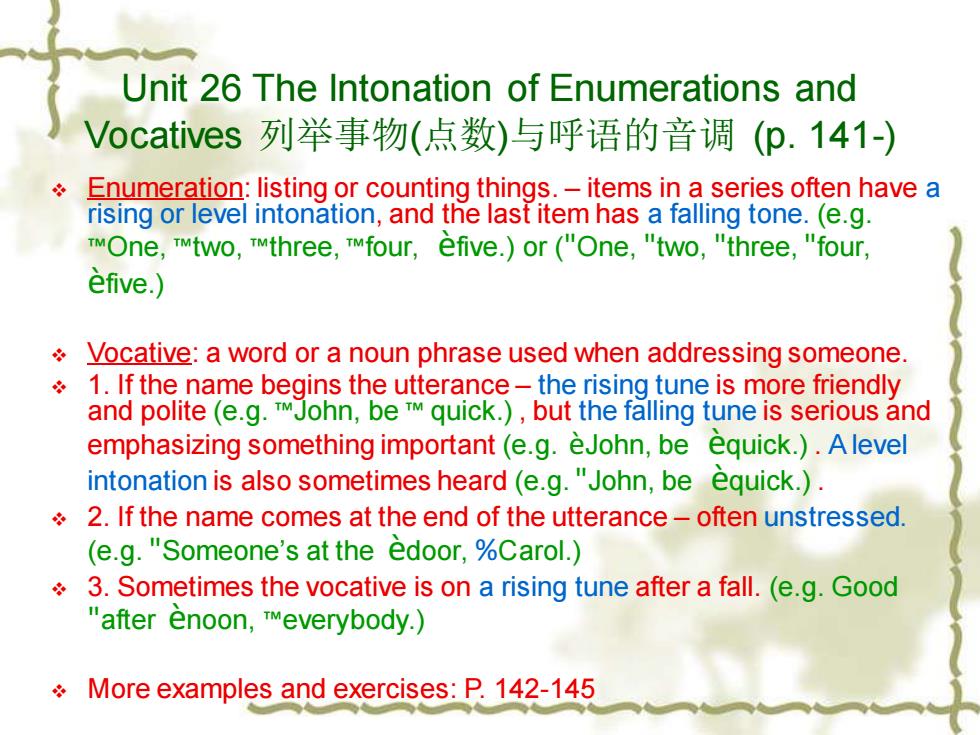
Unit 26 The Intonation of Enumerations and Vocatives列举事物(点数)与呼语的音调(p.141-) Enumeration:listing or counting things.-items in a series often have a rising or level intonation,and the last item has a falling tone.(e.g. TMOne,TMtwo,TMthree,TMfour,efive.)or ("One,"two,"three,"four, efive.) Vocative:a word or a noun phrase used when addressing someone 冬 1.If the name begins the utterance-the rising tune is more friendly and polite (e.g."MJohn,be TM quick.),but the falling tune is serious and emphasizing something important(e.g.eJohn,be equick.).Alevel intonation is also sometimes heard(e.g."John,be equick.). 2.If the name comes at the end of the utterance-often unstressed. (e.g."Someone's at the edoor,%Carol.) 3.Sometimes the vocative is on a rising tune after a fall.(e.g.Good "after enoon,TMeverybody.) More examples and exercises:P.142-145
Unit 26 The Intonation of Enumerations and Vocatives 列举事物(点数)与呼语的音调 (p. 141-) ❖ Enumeration: listing or counting things. – items in a series often have a rising or level intonation, and the last item has a falling tone. (e.g. ™One, ™two, ™three, ™four, èfive.) or ("One, "two, "three, "four, èfive.) ❖ Vocative: a word or a noun phrase used when addressing someone. ❖ 1. If the name begins the utterance – the rising tune is more friendly and polite (e.g. ™John, be ™ quick.) , but the falling tune is serious and emphasizing something important (e.g. èJohn, be èquick.) . A level intonation is also sometimes heard (e.g. "John, be èquick.) . ❖ 2. If the name comes at the end of the utterance – often unstressed. (e.g. "Someone’s at the èdoor, %Carol.) ❖ 3. Sometimes the vocative is on a rising tune after a fall. (e.g. Good "after ènoon, ™everybody.) ❖ More examples and exercises: P. 142-145
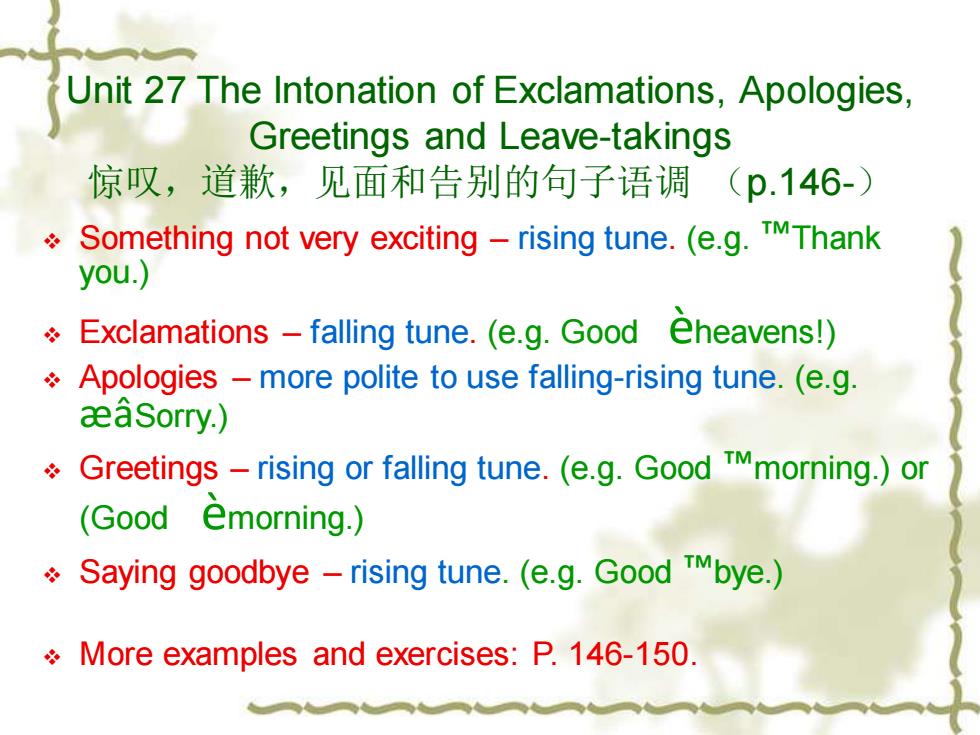
Unit 27 The Intonation of Exclamations,Apologies, Greetings and Leave-takings 惊叹,道歉,见面和告别的句子语调(p.146-) 冬 Something not very exciting-rising tune.(e.g.TMThank you.) Exclamations-falling tune.(e.g.Good eheavens!) Apologies -more polite to use falling-rising tune.(e.g. aeaSorry.) Greetings-rising or falling tune.(e.g.Good TMmorning.)or (Good emorning.) Saying goodbye-rising tune.(e.g.Good TMbye.) More examples and exercises:P.146-150
Unit 27 The Intonation of Exclamations, Apologies, Greetings and Leave-takings 惊叹,道歉,见面和告别的句子语调 (p.146-) ❖ Something not very exciting – rising tune. (e.g. ™Thank you.) ❖ Exclamations – falling tune. (e.g. Good èheavens!) ❖ Apologies – more polite to use falling-rising tune. (e.g. æ âSorry.) ❖ Greetings – rising or falling tune. (e.g. Good ™morning.) or (Good èmorning.) ❖ Saying goodbye – rising tune. (e.g. Good ™bye.) ❖ More examples and exercises: P. 146-150
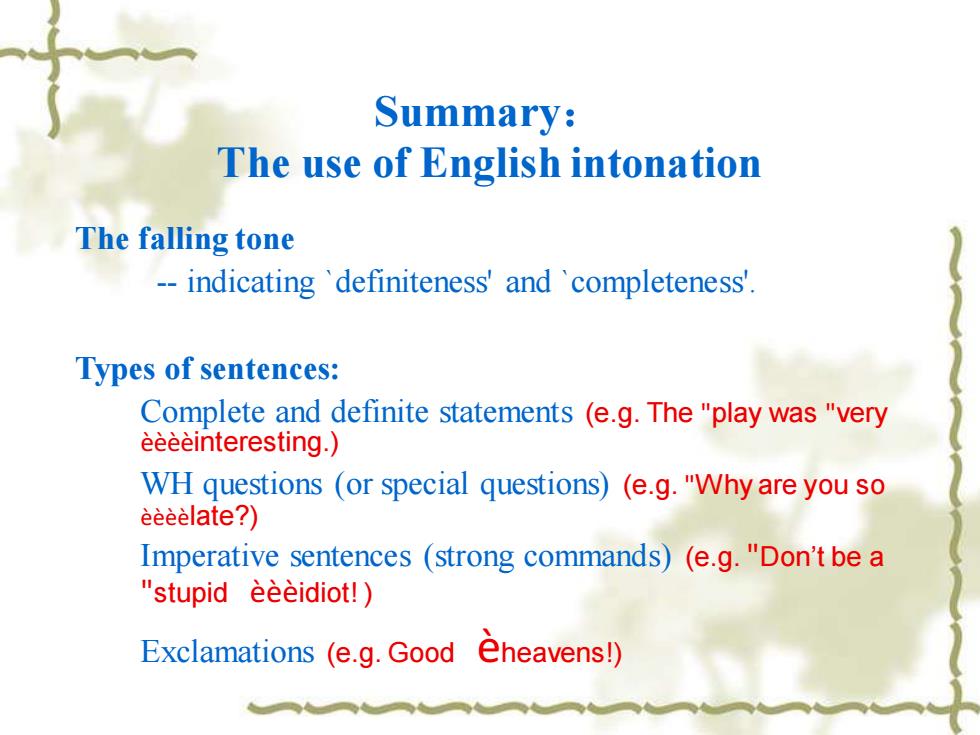
Summary: The use of English intonation The falling tone -indicating 'definiteness'and 'completeness'. Types of sentences: Complete and definite statements (e.g.The "play was "very eeeeinteresting.) WH questions (or special questions)(e.g."Why are you so eeeelate?) Imperative sentences (strong commands)(e.g."Don't be a "stupid eeeidiot! Exclamations (e.g.Good eheavens!)
Summary: The use of English intonation The falling tone - indicating `definiteness' and `completeness'. Types of sentences: Complete and definite statements (e.g. The "play was "very èèèèinteresting.) WH questions (or special questions) (e.g. "Why are you so èèèèlate?) Imperative sentences (strong commands) (e.g. "Don’t be a "stupid èèèidiot! ) Exclamations (e.g. Good èheavens!)
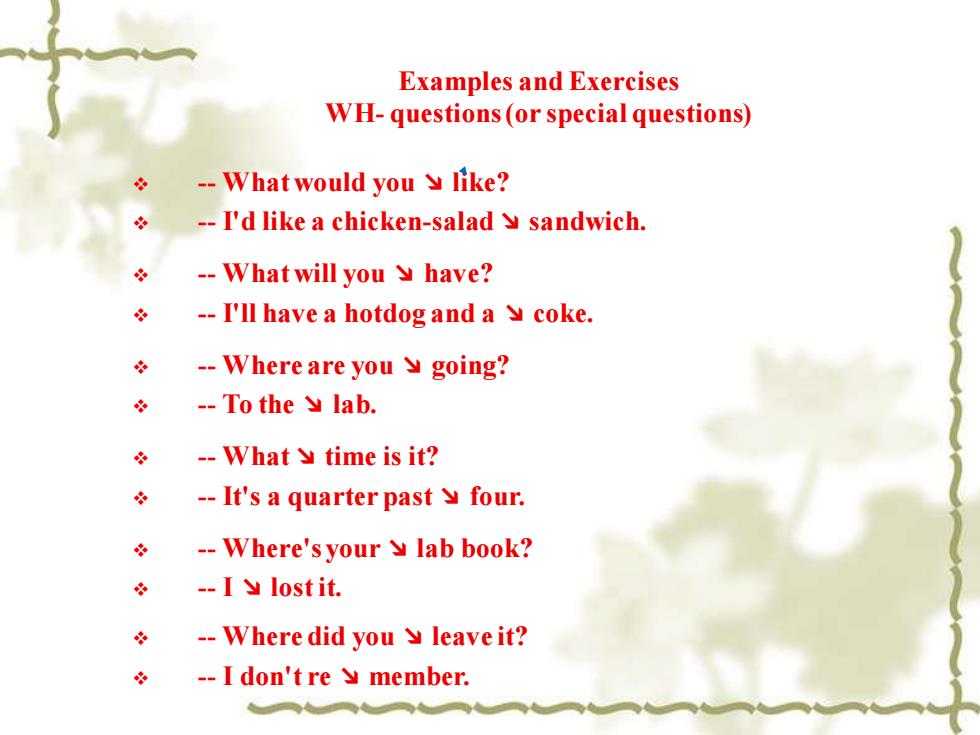
Examples and Exercises WH-questions(or special questions) -What would you y like? -I'd like a chicken-salad sandwich. -What will you y have? -I'll have a hotdog and a y coke. 必 -Where are you y going? 的 -To the y lab. 学 -What y time is it? 必 -It's a quarter past four. -Where's your y lab book? -I y lost it. -Where did you leave it? -I don'tre y member
Examples and Exercises WH- questions (or special questions) ❖ - What would you ↘ like? ❖ - I'd like a chicken-salad ↘ sandwich. ❖ - What will you ↘ have? ❖ - I'll have a hotdog and a ↘ coke. ❖ - Where are you ↘ going? ❖ - To the ↘ lab. ❖ - What ↘ time is it? ❖ - It's a quarter past ↘ four. ❖ - Where's your ↘ lab book? ❖ - I ↘ lost it. ❖ - Where did you ↘ leave it? ❖ - I don't re ↘ member